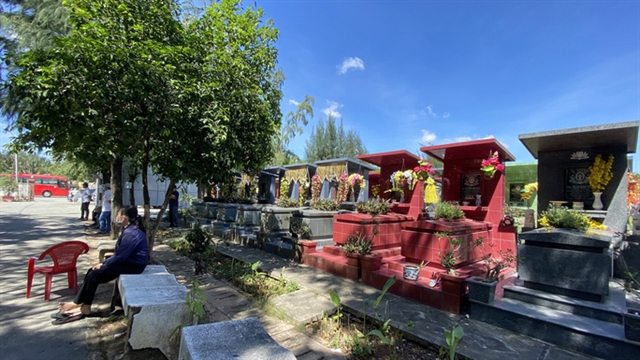 Society
Society

The amount of land for cemeteries in HCM City is shrinking and authorities have been asked to draw up plans for future needs.

|
| About 7.5ha of land in Đa Phước Cemetery in Bình Chánh District are covered in graves. Photo courtesy of nld.com.vn |
HCM CITY - The amount of land for cemeteries in HCM City is shrinking and authorities have been asked to draw up plans for future needs.
“My son died from cancer in January 2021. Burial costs were too high and it was not easy to find a cemetery in HCM City. So I decided to cremate. Since six temples nearby my house refused to store my son’s ashes, we had to go to District 8 to do so,” Nguyễn Một, a resident of Hiệp Bình Chánh Ward in Thủ Đức City told Người Lao Động (The Labourer) newspaper.
Phối Ngọc Thành, owner of Công Thọ Phúc’s funeral service in District 5, said that Bình Hưng Hoà Cemetery in Bình Tân District was once the largest cemetery in HCM City with a scale of more than 100,000 graves. However, it has temporarily stopped burials as authorities are carrying out relocation and clearance of some graves.
Đa Phước Cemetery in Bình Chánh District is currently considered the largest cemetery in HCM City at 67 hectares wide. Existing graves cover 7.5 hectares of the area.
“Compared to private cemeteries with land plots and construction services priced at VNĐ350 million to 2.5 billion per grave, Đa Phước Cemetery offers a much lower price point. But it is still considered high compared to locals’ average income,” Thành said.
“Specifically, the land price here ranges from VNĐ5 to 10 million per square metre and the total cost after installing ceramic tiles and granite is VNĐ50 to 100 million per grave. From the seventh year onwards, locals have to pay a maintenance fee of VNĐ350,000 per year,” he added.
“With that, most people choose to bury their loved ones in cemeteries in neighbouring provinces such as Thuận An City in Bình Dương Province, Long Thành District in Đồng Nai Province and Cần Giuộc District in Long An Province, among other places to save costs. The lower cost is about VNĐ50 million,” Thành said.
More than half of Thành’s clients who have hired funeral services from his facility have burial needs, while the rest have chosen cremation. The cremation process is challenging as many temples do not have places to worship the ashes.
The largest place to store ashes in HCM City is Long Thọ Tower Cremation Park in Củ Chi District. The cost of storing ashes is VNĐ500,000 to tens of millions of đồng, depending on the storage time and location of the ashes. Every year, there are additional costs of cleaning, checking and sending images or videos to relatives.
Some private cemeteries in District 12, Thủ Đức City and Bình Chánh District charge VNĐ5 to 80 million per 10 years per urn.
According to the HCM City Department of Natural Resources and Environment, the city currently does not allow burial in residential areas. Private cemeteries are small, with few burials allowed.
30-hectare cemetery in Cần Giờ District
The HCM City Department of Planning and Architecture recently sent the city People’s Committee a planning roadmap for a 30-hectare cemetery in Bình Lợi Hamlet in Bình Khánh Commune in Cần Giờ District.
Cần Giờ District currently has two cemeteries in Long Hoà and Bình Khánh communes. Long Hoà Cemetery has been closed for about five years now, and Bình Khánh Cemetery has only 150 slots left to deal with burial needs in the district.
With the urgent need for burials, the city Department of Planning and Architecture believes it is necessary to establish a cemetery soon and make sure it is in line with the development plan of Cần Giờ District.
On a different note, Venerable Thích Nhật Từ, permanent deputy director of the Việt Nam Buddhist Academy in HCM City, said that Việt Nam has over 18,000 temples nationwide.
Many have no available space to store ashes, so some temples carry out a water burial and release the ashes into the river.
“Vietnamese people have the custom of burials, but the high price of land has encouraged them to switch to cremation and water burials,” Venerable Thích Nhật Từ said, adding that some families have chosen to dry a small amount of ashes into a stone for worship. VNS




